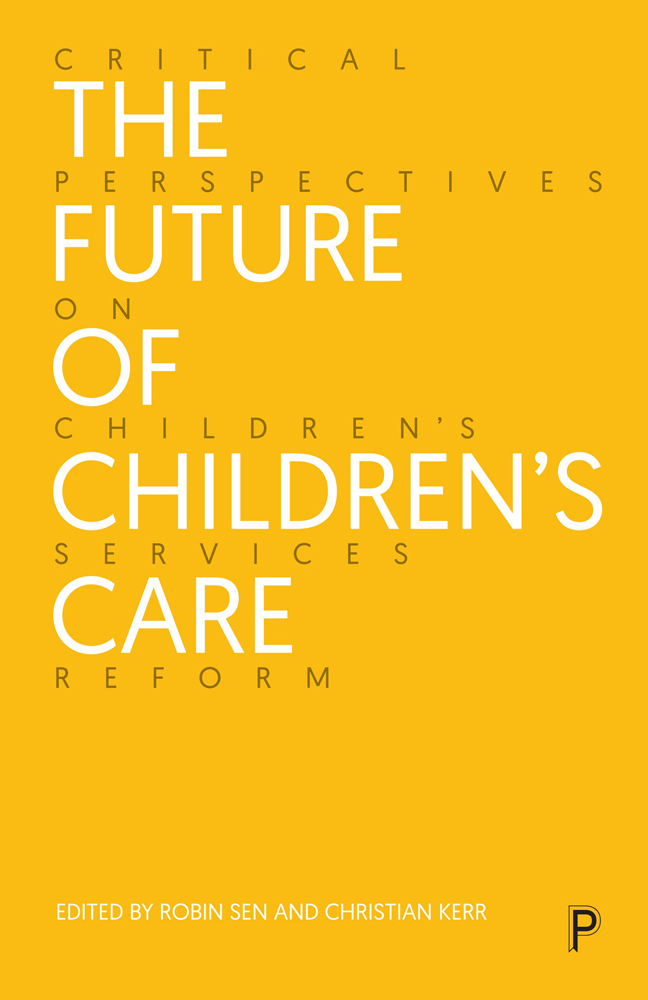Book contents
- Frontmatter
- Dedication
- Contents
- Notes on contributors
- Acknowledgements
- Foreword
- 1 Introduction: critical perspectives on children’s services reform
- 2 Where now? Children's rights in England into the 2020s
- 3 More of memes than schemes: networked propagation in children's social care
- 4 Reclaiming social work, the social work complex and issues of bias in children's services
- 5 Humane social work practice: a more parent friendly system? Hopes and challenges in the 2020s
- 6 Exploring and re-imagining children's services in England through a decolonial frame
- 7 Kinship care for England and Wales in the 2020s: assumptions, challenges and opportunities
- 8 If adoption is the answer, what was the question?
- 9 Caring for children and young people in state care in the 2020s
- 10 Protecting children: a social model for the 2020s
- 11 Conclusion: children's services reform looking back and forwards
- Index
11 - Conclusion: children's services reform looking back and forwards
Published online by Cambridge University Press: 23 January 2024
- Frontmatter
- Dedication
- Contents
- Notes on contributors
- Acknowledgements
- Foreword
- 1 Introduction: critical perspectives on children’s services reform
- 2 Where now? Children's rights in England into the 2020s
- 3 More of memes than schemes: networked propagation in children's social care
- 4 Reclaiming social work, the social work complex and issues of bias in children's services
- 5 Humane social work practice: a more parent friendly system? Hopes and challenges in the 2020s
- 6 Exploring and re-imagining children's services in England through a decolonial frame
- 7 Kinship care for England and Wales in the 2020s: assumptions, challenges and opportunities
- 8 If adoption is the answer, what was the question?
- 9 Caring for children and young people in state care in the 2020s
- 10 Protecting children: a social model for the 2020s
- 11 Conclusion: children's services reform looking back and forwards
- Index
Summary
Introduction
In this chapter we locate Josh MacAlister's calls for a ‘reset’ of the children's social care system (Crew, 2022; MacAlister, 2022) within the policy reform agenda of the last 25 years in England. We situate the Review's welcome emphasis on better supporting birth family care within a broader analytical framework. Drawing on insights from the chapters in the collection, this chapter identifies the potential for the MacAlister Review to be used as a vehicle for moving children's services policy reform in contradictory directions via a ‘double shuffle’. This would entail an apparent shift towards a greater family support orientation within the child welfare system which is undercut by neoliberal-influenced state defunding of children's services and/or greater deregulation and privatisation of the delivery of children's services provision. The chapter concludes by arguing for the importance of dissent within future policy development in children's services. We start by introducing two concepts that anchor the analytic framework we employ – Fox Harding's classic analysis of values positions in child welfare, and Stuart Hall's (2005) notion of the ‘double shuffle’ in policy development.
Lorraine Fox Harding produced an enduring typology of four different values positions within discussions of child welfare, family life and the role of the state within each (1991, 2014 [1997]):
1. Laissez-faire and patriarchy (‘laissez-faire’ position hereon): that the state should stay out of family life as much as possible and intervene only when it is clearly necessary to prevent harm.
2. State paternalism and child protection (‘child protection’ position hereon): that the state should prioritise the protection and prevention of harm to children within the family home.
3. Children's rights and child liberation (‘children's rights’ hereon): that the state should promote the participation of children about their own care as much as possible, seeing them as beings in their own right apart from adults.
4. Defence of the birth family and family rights (‘family rights’ hereon): that the state should respect families’ rights to care for children and support them to do so as much as possible, recognising the socio-economic influences on poor parenting.
- Type
- Chapter
- Information
- The Future of Children's CareCritical Perspectives on Children's Services Reform, pp. 194 - 213Publisher: Bristol University PressPrint publication year: 2023

